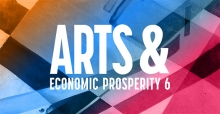Thursday, October 12, 2023
Presented by Americans for the Arts, the Study Includes the Role of the Arts in Diverse and Underrepresented Communities, Reducing Systemic Research Bias and Bringing Equity to Data
WASHINGTON, D.C., October 12, 2023—Americans for the Arts (AFTA), the leading organization for research and advocacy for the arts in the United States, announces the findings of its Arts and Economic Prosperity 6 Study (AEP6), the most comprehensive economic and social impact study of the nation’s $151.7 billion nonprofit arts and culture industry. Hosted by actress, singer, and activist Rita Moreno, the virtual release of the study’s findings takes place today–Thursday, October 12–at 2 p.m. ET; register here to watch live.
The groundbreaking AEP6 study—which marks the most extensive data collection effort in the 30-year history of the study—sought to break new ground by prioritizing equity, social impact, community engagement, and inclusivity. With a primary goal of reducing systemic bias, AFTA transformed its approach for AEP6 and expanded the inclusion and participation of organizations serving or representing BIPOC- (Black, Indigenous, People of Color) and ALAANA- (African, Latin, Asian, Arab, Native American) identifying communities.
“The data from the AEP6 study is a powerful validation that arts and culture are an economic driver at the community level,” said Nolen Bivens, President of Americans for the Arts. “Yet, the study also highlights the arts’ indispensable contribution to social and community development. This study–conducted with a focus on equity for the first time in 30 years–underscores that when we invest in arts and culture, we build more livable communities.”
The study found that in 2022, nonprofit arts and culture organizations and their audiences generated $151.7 billion in economic activity—$73.3 billion in spending by the organizations, which leveraged an additional $78.4 billion in event-related spending by their audiences. That economic activity supported 2.6 million jobs, generated $29.1 billion in tax revenue.
“By centering equity and consciously reducing systemic bias in AEP6, we’ve been able to establish a new benchmark for future studies,” said Dr. Genna Styles-Lyas, AEP6 Director of Community Engagement and Equity, at Americans for the Arts. “One of the things we learned through this inclusion-based research is that the economic and community impacts among BIPOC and ALAANA organizations are nearly identical to the overall national average. These findings should initiate new, and escalate existing, critical funding conversations about BIPOC and ALAANA organizations receiving fair and proportional financial support. It’s exciting to see this as a possible outcome of these findings.”
Additional AEP6 findings:
Equity and Inclusion
- Spending by attendees to BIPOC and ALAANA events reflect national spending. Attendees at organizations serving a community of color spend an average of $38.29 per person per event—virtually identical to the overall national average of $38.46. Spending by nonlocal attendees to BIPOC and ALAANA organizations was also nearly identical to the national average ($58.98 and $60.57, respectively).
Social Impact
- Arts and culture build livable communities in which residents take pride. 86% of Americans say, “arts and culture are important to their community’s quality of life and livability,” and 79% of the American public believe that the arts are “important to their community’s businesses, economy, and local jobs.” 89% of attendees agreed that the activity or venue they were attending was “a source of neighborhood pride for the community.”
The AEP6 findings echo stories told across the nation during the pandemic. Though severely affected by COVID-19, the arts played a crucial role in social healing and economic recovery. In times of isolation and loneliness, they provided much-needed joy and increased life satisfaction. The arts became an economic catalyst, sparking recovery.
“Music and the arts are the foundation of vibrant communities and help us connect, understand, and inspire one another—all while driving economic growth, creating rewarding jobs and careers, and powering our culture forward,” said Mitch Glazier, Chairman and CEO, Recording Industry Association of America, one of AFTA’s partner organizations for AEP6. “Americans for the Arts’ latest Arts and Economic Prosperity report does a vital service documenting the facts on the ground of the U.S. creative and nonprofit economy and offers valuable lessons and opportunities for communities seeking to boost their own arts footprint and activities.”
AEP6 was conducted over 18 months, surveyed more than 224,000 audience members and 16,400 arts and culture organizations in 373 diverse communities—ranging in population from 4,000 to 4 million—across all 50 states and Puerto Rico to ensure accurate representation of each arts landscape across rural, suburban, and large urban areas.
Seventeen national organizations partnered with AFTA on AEP6 to amplify the study results and help public and private-sector leaders understand the economic and social benefits that the arts bring to their communities, states, and the nation: Actors’ Equity Association, African Diaspora Consortium, Arts & Planning Division (American Planning Association), Black Legislative Leaders Network, Department for Professional Employees, AFL-CIO (American Federation of Labor and Congress of Industrial Organizations), Destinations International, International City/County Management Association, Independent Sector, National Association of Counties, National Conference of State Legislatures, National Alliance of Community Economic Development Associations, National Independent Venue Association, National Organization of Black Elected Legislative Women, Race Forward, Recording Industry Association of America, The Conference Board, and U.S. Conference of Mayors.
The full AEP6 findings and a map of the 373 study regions, along a two-page economic impact summary for each, can be found here.
For more information, follow us @Americans4Arts






